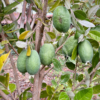NEED SUPPORT WITH YOUR ORDER? Get in touch
Not satisfied with your purchase?
Enter your Order ID on website, and we'll resolve it right away.
Original price was: $89.99.$69.99Current price is: $69.99.
Cultivate your own exotic fruit with a pineapple guava live plant (Feijoa Sellowiana). This 1-gallon potted tree is self-fertile guava, offering delicious fruit and evergreen foliage. Known for being a cold hardy fruit tree, it’s a versatile choice for many climates.
Mar 03
Mar 08 - Mar 10
Mar 13 - Mar 17
USDA Hardiness Zone
Soil Type
Sunlight Exposure
Expected Planting Period
Shipping and return policies: Our Alive & Thrive Guarantee covers issues with your plants within the first 30 days. Get in touch with us via email, and our team will review your concerns and, if necessary, provide you with a one-time replacement at no cost.
If you're unsure about your hardiness zone, feel free to reach out to us. Our team will answer your questions and help you find the plants that are truly suitable for your environment, climate, and personal preferences.
Embark on a delightful gardening journey with the pineapple guava live plant, scientifically known as Feijoa Sellowiana tree. This exceptional fruit tree is a fantastic addition to any garden, bringing both ornamental beauty and edible rewards. Imagine stepping into your backyard and harvesting your own large, flavorful, round guavas, fresh from the branch! Our seedling plants are nurtured in 1-gallon pots, ensuring they are robust and ready to thrive in your home garden. The Feijoa Sellowiana is celebrated for its unique taste, often described as a blend of pineapple, apple, and mint, making it a true tropical delight. Its versatility and ease of care make it a popular choice for both seasoned gardeners and those just starting their fruit-growing adventures. This plant promises to transform your outdoor space into a productive and beautiful oasis.
The pineapple guava live plant is more than just a fruit producer; it’s a resilient and attractive landscape specimen. With beautiful red and white flowers that bloom in the summer, it adds an elegant touch to your garden before the fruit even begins to ripen. Its evergreen foliage provides year-round visual interest and a continuous splash of green, even during colder months when many other plants have lost their leaves. This plant is a testament to nature’s bounty, offering both aesthetic appeal and a bountiful harvest. If you’re looking to grow pineapple guava, this 1-gallon tree is an excellent starting point for a rewarding experience.
The pineapple guava live plant offers a multitude of benefits, making it an outstanding choice for diverse garden settings. Its unique characteristics contribute to a low-maintenance yet highly rewarding gardening experience.
Caring for your pineapple guava live plant is straightforward, making it an excellent choice for both novice and experienced gardeners. This adaptable Feijoa Sellowiana tree thrives with consistent care, ensuring healthy growth and a bountiful harvest. For optimal fruit production, understanding its specific needs is key. Begin by selecting the right location in your garden. The Pineapple Guava performs best in full sun to part sun, meaning it requires at least 6 hours of direct sunlight daily, but can tolerate some afternoon shade in hotter climates. Ensure the planting site has good air circulation to prevent fungal issues.
When it comes to soil, the pineapple guava live plant prefers well-draining soil. While it can tolerate various soil types, a slightly acidic to neutral pH (6.0-7.0) is ideal. Amend heavy clay soils with organic matter like compost or pine bark to improve drainage and aeration. Regular watering is crucial, especially during dry periods and the plant’s establishment phase. Keep the soil consistently moist but never waterlogged, as this can lead to root rot. Once established, it shows some drought tolerance but will produce better fruit with regular moisture. Fertilize in early spring with a balanced, slow-release fertilizer formulated for fruit trees, following package directions. Avoid over-fertilizing, which can promote leafy growth at the expense of fruit.
Pruning is important for maintaining the shape of your cold hardy fruit tree and encouraging fruit production. Prune in late winter or early spring to remove any dead, damaged, or crossing branches, and to open up the canopy for better light penetration and air circulation. While the plant is generally robust, keep an eye out for common pests like scale insects or fruit flies, and address them promptly with organic pest control methods if necessary. Its resilience as a self-fertile guava in USDA Zone 7 means it can withstand winter temperatures down to around 10-15°F (-12 to -9°C). Protecting young plants during severe cold snaps with frost cloths can be beneficial. Following these care tips will help you successfully grow pineapple guava and enjoy its unique fruit for years to come.
This pineapple guava live plant is supplied in a 1-gallon nursery pot, ensuring it has a well-established root system ready for transplanting into your garden or a larger container. At maturity, the Feijoa Sellowiana tree typically reaches a height of 10-15 feet and a similar spread, forming a dense, rounded shrub or small tree. Its growth rate is moderate, allowing it to establish quickly while remaining manageable. The plant’s evergreen nature means it retains its foliage year-round, providing continuous appeal. Fruit production typically begins 2-3 years after planting, with a significant harvest expected as the plant matures. The fruit usually ripens in the fall, offering a seasonal bounty of delicious guavas. This cold hardy fruit tree is a long-term investment that will continue to yield fruit for many years.
You must be logged in to post a review.

Reviews
There are no reviews yet.